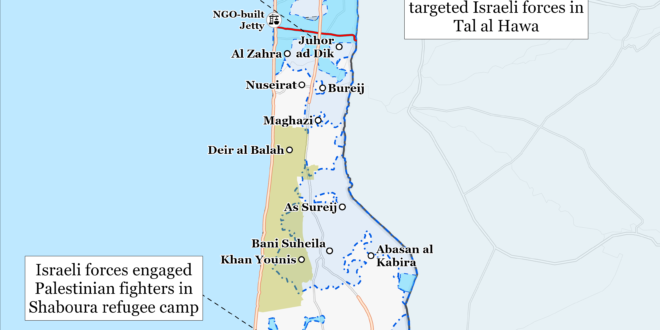Israel killed Hamas Political Bureau Chairman Ismail Haniyeh in Tehran on July 30. Israeli agents appeared to have launched an explosively laden drone or missile from inside Iran to target Haniyeh, who was visiting for the inauguration of Iranian President Masoud Pezeshkian. Haniyeh was staying at a facility with the IRGC Quds Force in northern Tehran.[1] The killing of Haniyeh reflects the degree to which Israel has infiltrated the Iranian security sector and is able to strike high-value targets within Iran. Hamas responded to the killing by calling on Middle Eastern countries to “deter” and “rein in” Israel.[2] Hamas also threatened to expand the war against Israel to ”new dimensions.”[3]
Iran is signaling that it will retaliate directly for Israel killing Haniyeh. The Iranian Supreme National Security Council (SNSC), which is the seniormost Iranian defense and foreign policy body, held an emergency meeting on July 31 to discuss the killing of Haniyeh.[4] Supreme Leader Ali Khamenei attended the SNSC meeting, which is rare but normal during serious crises, including immediately following the United States killing Qassem Soleimani in January 2020.[5] Three anonymous Iranian officials told the New York Times that Khamenei ordered a direct strike on Israel during the SNSC meeting.[6] Khamenei later published a statement that blamed Israel directly and vowed retaliation.[7] The Islamic Revolutionary Guards Corps (IRGC) similarly published a statement saying that the Axis of Resistance and ”especially Iran” will retaliate against Israel.[8] Iran separately raised the red flag of Imam Hossein over the Jamkaran Mosque in Qom, which signals an Iranian intent to seek revenge.[9] Iran similarly raised the red flag after the United States killed Soleimani.
One of the most dangerous courses of action would be Iran and other members of the Axis of Resistance conducting a large-scale, combined drone and missile attack into Israel. Iran could launch an attack similar to the one it conducted against Israel in April 2024, which involved around 300 drones and ballistic and cruise missiles.[10] Iran could target multiple locations in Israel or mass its fire on a single target. Using a large strike package against even a single target could still appear as a widespread attack. This scenario would also involve simultaneous attacks from other members of the Axis of Resistance, such as Hezbollah, the Houthis, and Iranian-backed militias in Iraq and Syria. Such a combined Iranian-Axis of Resistance attack would be especially dangerous because attacking from multiple direction would put greater pressure on Israeli air defenses than the Iranian attack in April 2024 did. The United States and Israel were furthermore able to defend against the Iranian attack in April 2024 so effectively in part because it took the attack drones several hours to get from Iran to Israel.[11] That hours-long period gave the United States, Israel, and their regional partners time to prepare their defenses and intercept all of the drones. The United States and Israel would have far less warning and opportunity to intercept if the Axis of Resistance launched large swarms of drones from Iraq, Lebanon, or Syria toward Israel. Hezbollah may be especially incentivized to participate in such an attack given its desire to retaliate for Israel killing Fuad Shukr in Beirut, though Hezbollah has not yet indicated that it would retaliate for the killing of Shukr at the time of this writing. CTP-ISW has noted previously that Hezbollah and the Houthis have probed Israeli air defenses to better understand the strengths and weaknesses.[12]
Lebanese Hezbollah confirmed that the IDF killed one of its seniormost commanders, Fuad Shukr in Beirut on July 30.[13] Hezbollah Secretary General Hassan Nasrallah is expected to speak on Hezbollah’s “political position” at Shukr’s funeral on August 1.[14] The IDF Air Force targeted Shukr in a building in southern Beirut, where Hezbollah has a deep and long-standing presence.[15] The IDF was responding to a Hezbollah rocket attack that killed 12 Israeli children in the Golan Heights on July 27. IDF Chief of Staff Lieutenant General Herzi Halevi said that Shukr gave the orders for the rocket attack.[16]
Shukr had led the Hezbollah attack campaign into northern Israel since the Israel-Hamas war began.[17] Shukr has been described as Nasrallah’s ”right-hand man” and roughly equivalent to the chief of staff of Hezbollah forces.[18] Hezbollah said in a statement mourning Shukr that he was part of Hezbollah’s founding generation and fought in the 1982 and 2006 wars in Lebanon.[19] Shukr later served on Hezbollah’s highest decision-making body—the Shura Council—as well as its top military body—the Jihad Council—since its founding.[20] The IDF stated that Shukr managed Hezbollah’s advanced weapons arsenal, including sophisticated drones, missiles, and rockets.[21] Several Palestinian militias, including Hamas, mourned Shukr’s death and lauded his central role in the war against Israel.[22]
The United States conducted a self-defense strike on July 30 targeting Iranian-backed militants in Iraq, who were preparing to launch a one-way attack drone.[23] The United States deemed the drone to be a threat to US and International Coalition forces given the recent Iranian-backed militia attacks on US positions in Iraq and Syria.[24] The US strike comes as Iranian-backed Iraqi militias have resumed their campaign to expel US forces from Iraq and Syria. The Iraqi militants whom the United States struck were affiliated with prominent Iranian-backed Iraqi militia Kataib Hezbollah.[25] The United States killed four Iraqi militants and wounded another four, according to Reuters.[26] Kataib Hezbollah claimed that the United States struck ”drone experts,” who were working to implement new security measures for Shia pilgrims.[27] Kataib Hezbollah also claimed that the United States launched the self-defense strike from Kuwait and warned Kuwait against allowing the United States to launch attacks from its territory.[28]
Key Takeaways:
- Iran: Israel killed Hamas Political Bureau Chairman Ismail Haniyeh in Tehran. Iran is signaling that it will retaliate directly. One of the most dangerous courses of action would be Iran and the Axis of Resistance launching a large-scale, combined drone and missile attack into Israel.
- Lebanon: Lebanese Hezbollah confirmed that Israel killed one of its seniormost commanders, Fuad Shukr, in Beirut. Hezbollah Secretary General Hassan Nasrallah will address the killing of Shukr during his funeral on August 1.
- Iraq: The United States conducted a self-defense strike targeting Iranian backed militants in Iraq, who were preparing to launch a one-way attack drone. Iranian-backed militias have resumed their campaign to expel US forces from Iraq and Syria in recent days.
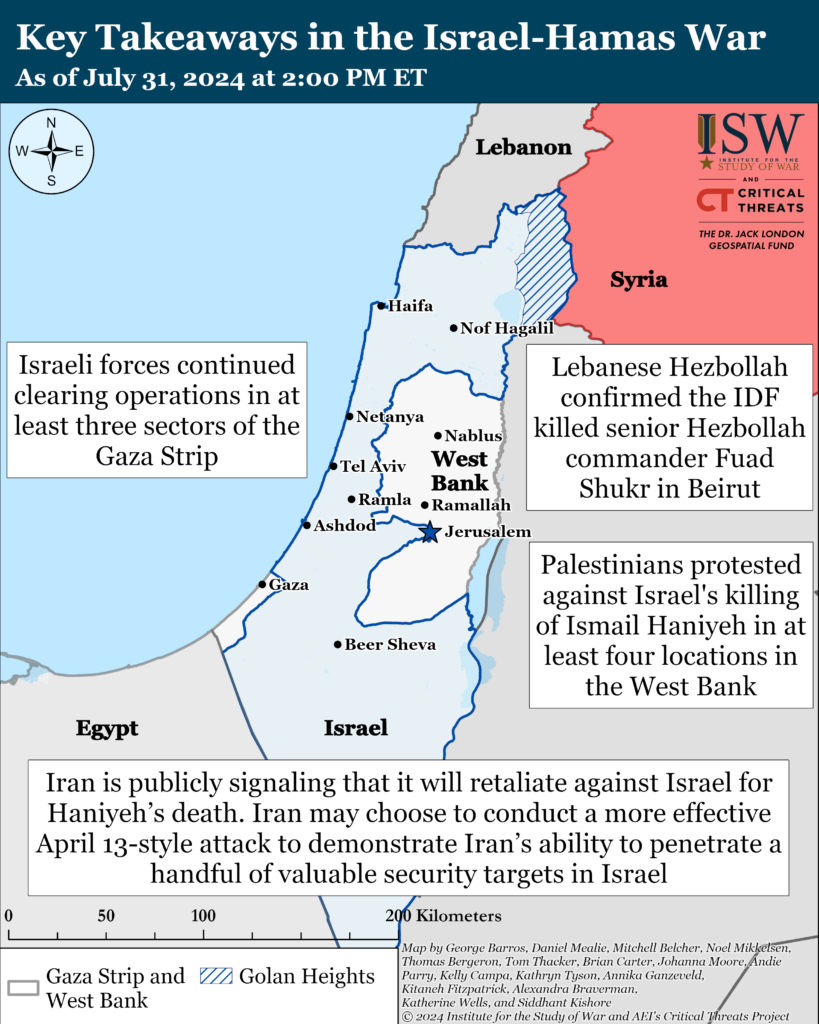
Gaza Strip
Axis of Resistance objectives:
Erode the will of the Israeli political establishment and public to sustain clearing operations in the Gaza Strip
Reestablish Hamas as the governing authority in the Gaza Strip
The IDF 252nd Division continued operating along the Netzarim Corridor on July 31. Israeli forces conducted targeted raids and destroyed militia infrastructure.[29] Israeli forces identified a cell of Palestinian fighters planting improvised explosive devices (IED) to target Israeli forces in the area and directed an airstrike against the cell.[30] Palestinian Islamic Jihad (PIJ) mortared Israeli forces and vehicles stationed along the Netzarim Corridor.[31] Hamas and PIJ coordinated to launch short-range rockets at IDF units near the corridor east of Juhor ad Dik.[32]
Palestinian fighters targeted Israeli forces in Tal al Hawa on July 31. The al Aqsa Martyrs’ Brigades mortared Israeli forces near al Baraa bin Azib Mosque in Tal al Hawa.[33]
Palestinian media reported that an IDF airstrike killed a Palestinian journalist and cameraman in al Shati refugee camp, west of Gaza City, on July 31.[34] The airstrike killed al Jazeera journalist Ismail al Ghoul and cameraman Ramy al Rify inside a vehicle after the pair reported from a destroyed home in al Shati refugee camp that belonged to Ismail Haniyeh’s family.[35] An Israeli military correspondent reported that one of the two men was reportedly a Hamas operative, citing a military source.[36]
The IDF 162nd Division continued clearing operations in Rafah on July 31. The IDF 401st Brigade raided militia infrastructure and killed Palestinian fighters in Tal al Sultan.[37] Israeli forces engaged four Palestinian militias in several sectors of Rafah.[38] Hamas, Palestinian Islamic Jihad, and the al Aqsa Martyrs’ Brigades targeted Israeli forces with mortars and rocket-propelled grenades in Shaboura refugee camp.[39]
The IDF Air Force struck dozens of militia targets in the Gaza Strip from July 30 to July 31.[40] The IDF announced that it struck Palestinian fighters and militia infrastructure, including underground tunnels, across the Gaza Strip.[41]
The IDF reported that its 35th Paratroopers Brigade (98th Division) directed sniper fire, tank fire, and airstrikes targeting Palestinian fighters in Khan Younis in recent days.[42] The IDF said that Israeli forces located and destroyed a long-range rocket launcher in Khan Younis.[43] The IDF Yahalom combat engineering unit destroyed an underground tunnel approximately 25 meters deep and two kilometers long.[44] The IDF said that the tunnel contained front doors and living quarters.[45] Israeli forces located a tunnel shaft within a Palestinian fighter’s house from which fighters launched rockets.[46] The tunnel shaft led to a tens-of-meters long tunnel, which Israeli forces destroyed.[47]
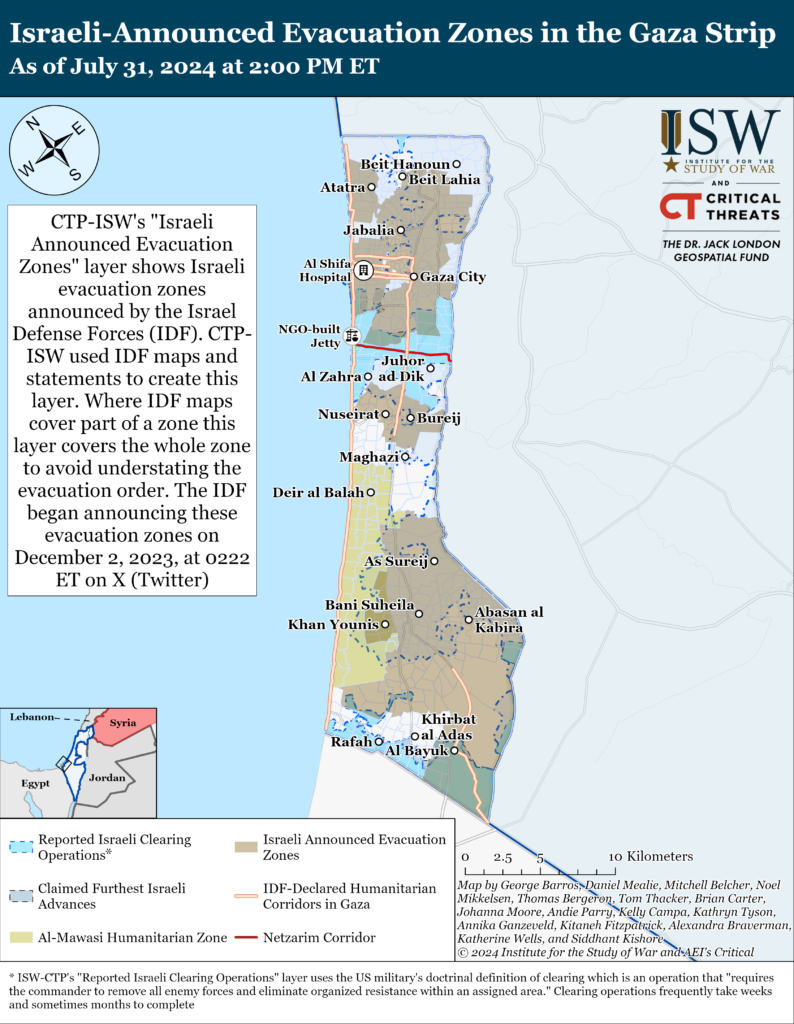
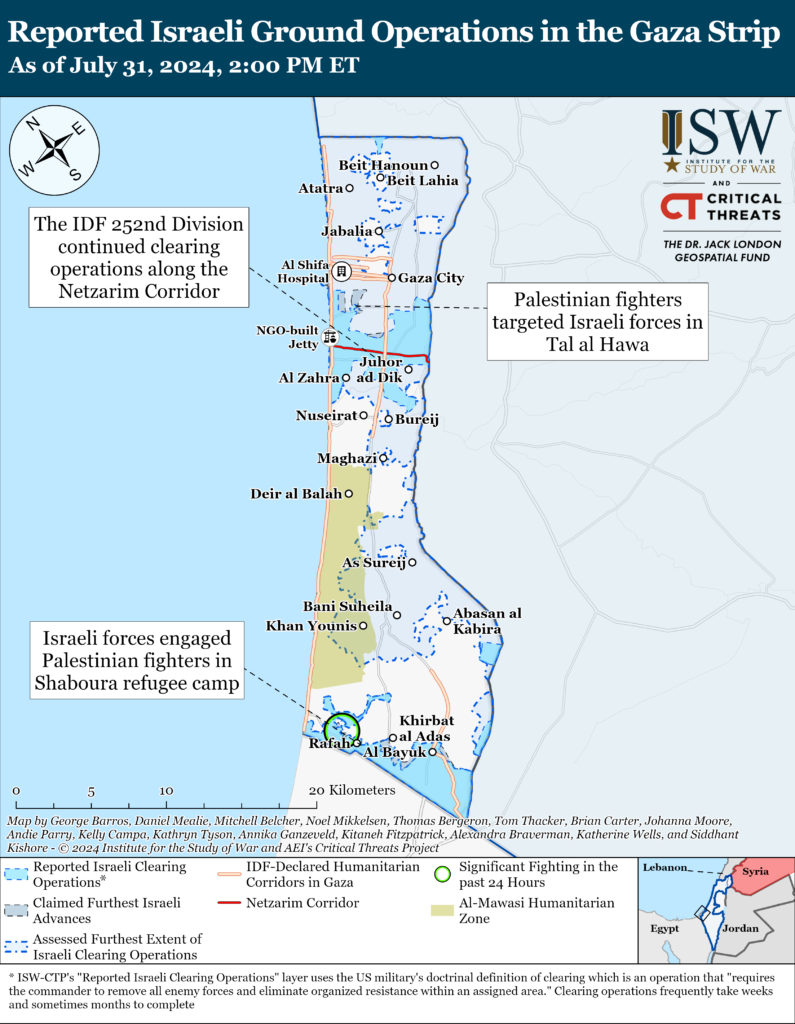
West Bank
Axis of Resistance objectives:
Establish the West Bank as a viable front against Israel
Israeli forces have engaged Palestinian fighters in at least two locations in the West Bank since CTP-ISW’s last data cut-off on July 31.[48] A Hamas fighter conducted a shooting and stabbing attack targeting an Israeli civilian in Kiryat Arba settlement in Hebron on July 31.[49] The IDF claimed that the Hamas fighter first opened fire from a vehicle and then stabbed the victim.[50] An Israeli military correspondent reported that the IDF detained the Hamas fighter after launching a search operation in the area.[51] Hamas separately fired small arms targeting Israeli forces near Ibrahim Mosque in Hebron.[52] The Hamas battalion claimed that both attacks in Hebron were the ”first rapid response” to Israel’s killing of Hamas Political Bureau Chairman Ismail Haniyeh.[53] Palestinian Islamic Jihad (PIJ) separately fired small arms targeting Shaked settlement in the West Bank on July 31.[54]
Palestinians protested against Israel killing Ismail Haniyeh in at least four locations across the West Bank on July 31.[55] Hamas issued multiple statements calling upon Palestinians to demonstrate across all West Bank governorates.[56]
The IDF conducted an overnight raid in the West Bank and seized a lathe for producing small arms.[57] The IDF also identified and confiscated three unspecified weapons during the raid. The IDF has also detained 40 wanted persons during two separate raids in Burqa and Dheisheh refugee camp in the past week.[58] The IDF claimed that it confiscated unspecified numbers of weapons and questioned suspects in those operations.
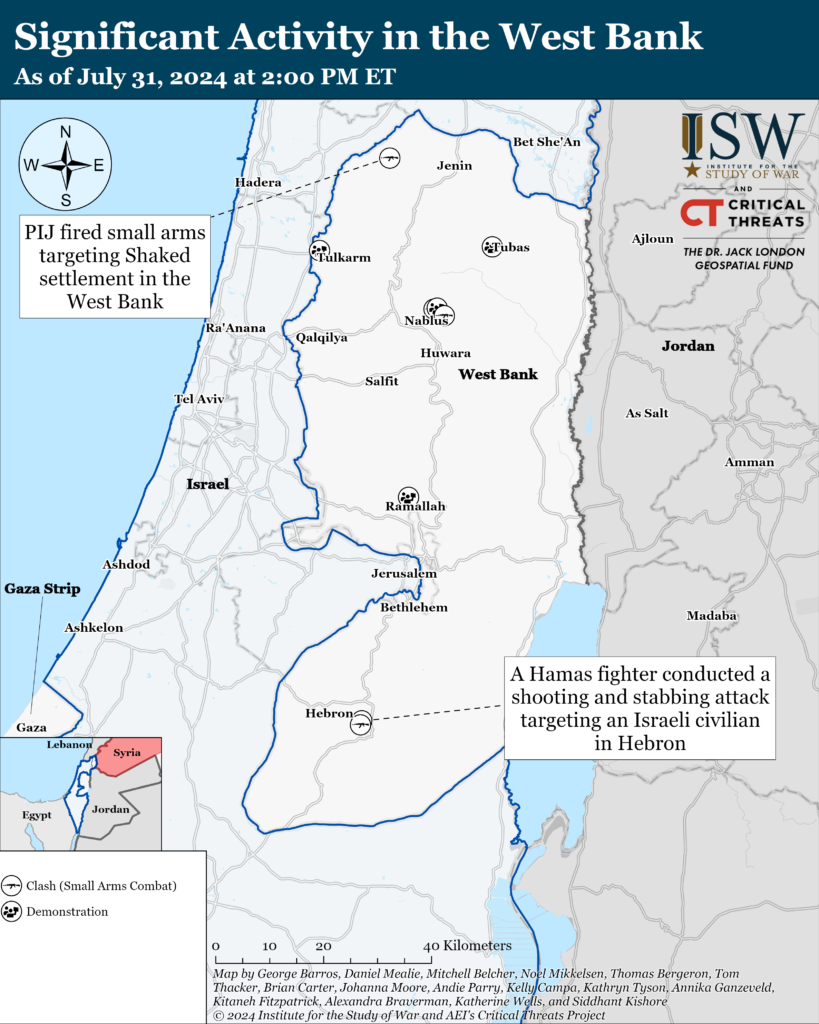
This map is not an exhaustive depiction of clashes and demonstrations in the West Bank.
Southern Lebanon and Golan Heights
Axis of Resistance objectives:
Deter Israel from conducting a ground operation into Lebanon
Prepare for an expanded and protracted conflict with Israel in the near term
Expel the United States from Syria
Lebanese Hezbollah has not claimed any attacks into northern Israel since CTP-ISW’s last data cut-off on July 30. The IDF intercepted a single drone launched from Lebanon on July 31.[59] The drone did not cross into Israeli airspace.[60]
IDF Chief of Staff Lieutenant General Herzi Halevi visited the northern border on July 31 to observe an IDF training exercise simulating combat in northern Israel and Lebanon.[61] The IDF Kfir Brigade conducted exercises to train forces for several “extreme scenarios,” including fighting in mountainous and urban terrain.[62] Halevi said that the IDF does not intend for Hezbollah to “return to October 6” or maintain a presence along the border “200 meters” from the northern Israeli border towns Metulla, Shtula, or Rosh HaNikra.[63]
Iran and the Axis of Resistance
Supreme Leader Ali Khamenei met with senior Houthi and Hezbollah officials separately in Tehran on July 30.[64] Khamenei met with senior Houthi official Mohammad Abdulsalam and expressed his thanks for Houthi support for Hamas.[65] Khamenei also praised Hezbollah for fighting Israel in a meeting with Hezbollah Deputy Secretary General Naim Qassem[66] Qassem briefed Khamenei on the latest developments in Lebanon and northern Israel.
US Central Command (CENTCOM) destroyed three Houthi unmanned surface vessels (USV) in the Red Sea on July 30.[67] CENTCOM determined that the USVs presented an imminent threat to US and coalition forces and merchant vessels in the area.
A senior US delegation arrived in Saudi Arabia on July 30 to discuss Yemen and recent Israel-Houthi tensions.[68] White House Middle East adviser Brett McGurk is heading the US delegation. McGurk will next travel to Cairo to discuss ceasefire and hostage negotiations between Israel and Hamas.
The US Treasury Department Office of Foreign Assets Control (OFAC) sanctioned two individuals and four companies on July 31 for facilitating weapons procurement for the Houthis.[69] These sanctions target actors located in China, such as in Hong Kong, and Yemen. These sanctions build on OFAC sanctioning seven entities in June 2024 for facilitating Houthi weapons procurement.[70]
OFAC sanctioned the following individuals and companies in the latest designations:
Director and General Manager of Guangzhou Alshahari Ahmed Khaled Yahya al Shahare
Yemeni businessman Maher Yahya Muhammad Mutahar al Kinai
Yemen-based logistics company al Sharai United Corporation Ltd
Al Shahari United China-based branch Guangzhou Alshahari United Corporation Limited
Owner of Guangzhou Alshahari Hongkong Alshahari United Corporation Limited
Sanaa, Yemen-based company Yemen Telecommunication Asset Company for Information Technology
EU Deputy Secretary General Enrique Mora met with Abbas Araghchi in Tehran on July 31.[71] Iranian and Western media did not publish the details of the meeting. Amwaj media reported on July 28 that Abbas Araghchi is newly sworn-in President Masoud Pezeshkian’s nomination for foreign affairs minister.[72] Amwaj citing unspecified senior Iranian sources reported that Supreme Leader Ali Khamenei approved Pezeshkian’s nomination of Araghchi. Araghchi played a prominent role in the nuclear negotiations with the West under the Hassan Rouhani administration and served as Rouhani’s deputy foreign affairs minister for policy between 2017 and 2021.[73] Pezeshkian’s nomination of Araghchi and Araghchi’s meeting with Mora indicate Pezeshkian’s intent to seriously pursue nuclear negotiations with the West. It is unclear whether the Iranian Parliament, which is currently dominated by hardliners, would approve Araghchi as foreign affairs minister.[74]
Newly sworn-in Iranian President Masoud Pezeshkian continued to hold meetings with foreign officials on July 30 and July 31. Pezeshkian discussed strengthening bilateral relations with Russian State Duma Chairperson Vyacheslav Volodin.[75] Pezeshkian emphasized that one of his foreign policy priorities is developing ties with Russia and other neighboring countries. Both parties expressed a continued commitment to accelerating joint projects, including the International North South Corridor.[76] Pezeshkian stated that, if Russia and Iran strengthen their capabilities, US and western sanctions will no longer be effective. Pezeshkian also met with the Brazilian vice president, the Serbian deputy prime minister, the Azerbaijani prime minister, the Algerian parliament speaker, the Malian parliament speaker, the Senegalese parliament speaker, the Zimbabwean vice president, and the Eritrean foreign minister.[77]
Iran is continuing to try to deepen economic and political relations with African countries. Iranian Parliament Speaker Mohammad Bagher Ghalibaf separately met with the parliament speakers of Burkina Faso and Mali on the sidelines of Iranian President Masoud Pezeshkian’s inauguration on July 30.[78] Ghalibaf stated that cultivating relations with Africa, especially west African countries, is a foreign policy priority of Supreme Leader Ali Khamenei during Ghalibaf’s meeting with Burkinabe Parliament Speaker Usman Bokoma.[79] Interim Foreign Affairs Minister Ali Bagheri Kani separately met with the Egyptian and Sudanese foreign affairs ministers on July 30.[80] Bagheri Kani reiterated that pursuing relations with African countries is part of Iran’s ”neighborhood policy.“[81] The ”neighborhood policy” involves building relations with states in and around the Middle East.[82] Bagheri Kani‘s meeting comes after Sudan reopened its embassy in Tehran on July 30 after previously severing diplomatic ties with Iran in 2016.[83]
 Eurasia Press & News
Eurasia Press & News
